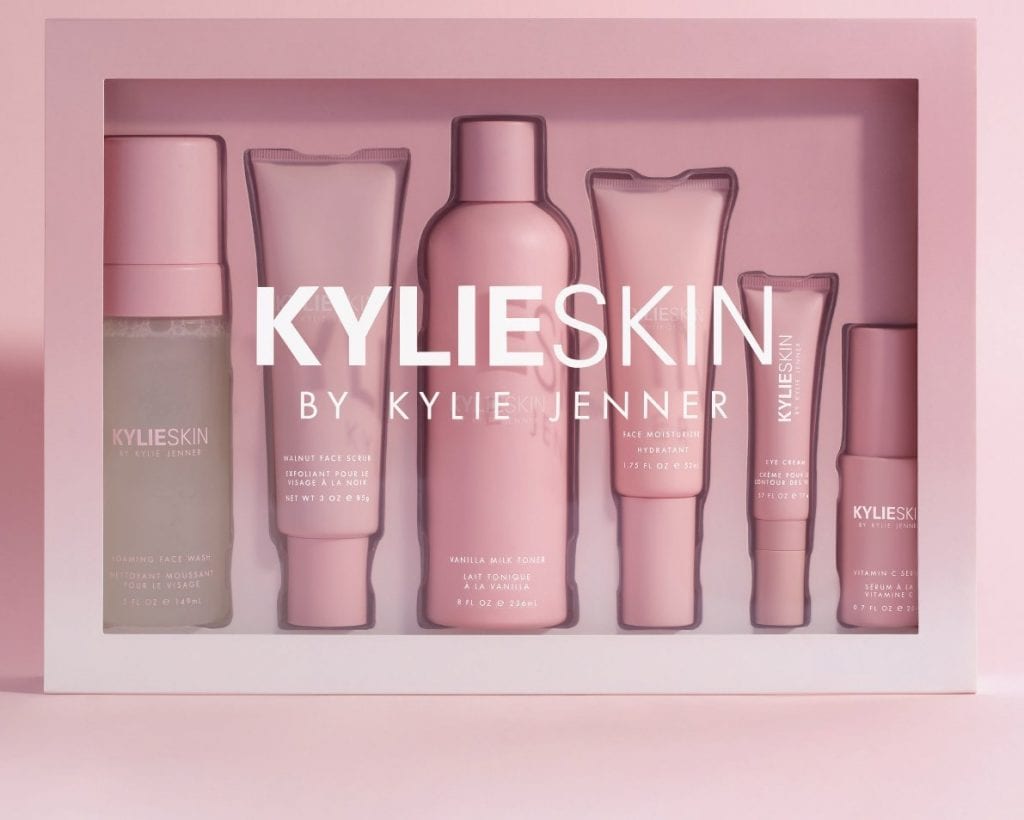How big is Kylie Jenner’s “$1 billion” beauty brand? That is the question being posed by Forbes in connection with the 22-year old’s Kylie Cosmetics venture and her since-revoked status as a billionaire on Forbes’ annual list. According to Forbes, filings tied to the sale of a majority stake in Kylie Cosmetics to beauty conglomerate Coty, Inc. “lay bare one of the family’s best-kept secrets: Kylie’s business is significantly smaller, and less profitable, than the family has spent years leading the cosmetics industry and media outlets, including Forbes, to believe.”
In a deep dive into Kylie Cosmetics published on Friday, Forbes asserts that the fine print of the Coty acquisition deal – which saw Jenner sell off majority of the now-6-year old company that she started by way of hot-selling lip kits – “reveals that [Jenner] has been inflating the size and success of her business for years.” In exchange for $600 million, Jenner sold a 51 percent stake in her eponymous company to Coty in November 2019.
According to Forbes, inaccurate numbers as to the size of the Kylie Cosmetics business have been circulating almost from the outset. In 2017, Forbes claims that the Jenners presented its reporters with tax returns – that the publication claims were “likely forged” – detailing $307 million in 2016 revenues for Kylie Cosmetics. Shortly thereafter, in August 2017, Forbes claims that based on documentation provided by the Jenners (i.e., Kylie and her mother/momager Kris Jenner), Women’s Wear Daily erroneously reported that Kylie Cosmetics had generated $420 million in retail sales in 18 months (from 2016 through the beginning of 2017), and was well on its way to becoming a $1 billion brand.
“That sky-high revenue number – repeated everywhere from People to CNBC and Fortune – took hold,” but in reality, Forbes says the numbers are off based on public filings from Coty. The American multinational beauty company’s records show that Kylie Cosmetics actually “generated about $125 million [in 2018],” prompting Forbes to ponder how – “if Kylie Cosmetics did $125 million in sales in 2018 – could it have done $307 million in 2016 (as the company’s supposed tax returns state) or $330 million in 2017?”
As for Jenner’s skincare line, which launched in May 2019, Jenner’s reps allegedly “told [Forbes] that it did $100 million in revenues in its first month and a half.” Yet, Forbes claims that Coty’s “filings show the line was actually ‘on track’ to finish the [2019 fiscal] year with just $25 million in sales.” (In Coty’s third quarter earnings call earlier this month, Pierre-Andre Terisse, the company’s Chief Operating Officer and Chief Financial Officer, stated that “the performance of skincare for Kylie in [the] direct to consumer [segment] has been strong and we are working at widening and strengthening the platform,” noting that “In skin, we need to accelerate now. We have one very, very strong and important, which is playing both in skin and in direct consumer, and this is Kylie. I can promise you that this is going to be a real asset for [Coty].”).
Speaking to Forbes about the latest information that Coty released about the state of the Kylie Cosmetics brand, Stephanie Wissink, an equity analyst covering consumer products at Jefferies, says that “everybody was surprised … the business was a lot smaller than everybody had expected.”
While there is a chance that Jenner’s Kylie Cosmetics “grew from nothing to $300 million in sales in a single year,” and then “quietly fell by more than half in a single year,” Forbes has taken a far more skeptical stance than it did in its August 31, 2018 issue, which featured Jenner on the cover and touted her as “set to be the youngest-ever self-made billionaire.”
In its article on Friday, Forbes says it is “more likely [that Jenner’s] business was never that big to begin with, and the Jenners have lied about it every year since 2016 – including having their accountant draft tax returns with false numbers – to help juice Forbes’ estimates of Kylie’s earnings and net worth,” in furtherance of a quest to land the young star on its magazine cover.
“While we can’t prove that those documents were fake (though it’s likely), it’s clear that Kylie’s camp has been lying,” Forbes’ Chase Peterson-Whithorn and Madeline Berg assert, noting that based on the “new information” from Coty’s filings and given the impact of COVID-19 on beauty stocks and consumer spending, it “now thinks that Kylie Jenner, even after pocketing an estimated $340 million after tax from the sale, is not a billionaire.”
Jenner took to Twitter on Friday, stating in reference to the Forbes article, “All I see are a number of inaccurate statements and unproven assumptions lol. I’ve never asked for any title or tried to lie my way there EVER. Period.” As for Forbes’ suggestion that her tax returns were “forged,” the reality star-splash-beauty brand builder, asked, “So, you just THOUGHT they were forged? Like actually what am I reading?”
Meanwhile, in a statement last week, Coty revealed that it has “started to build a strong foundation to support our strategic partnership with Kylie Jenner,” with the recent launch of Kylie Skin in Europe serving as “a next step as we accelerate the integration and build Kylie Jenner’s beauty businesses into a global powerhouse brand.”
It will be interesting to see if/how Jenner and Coty formally respond to Forbes’ most recent article, and whether such a response will involve threats of legal action, namely in connection with its allegations that Jenner likely forged her tax returns in order to boost the apparent value of her beauty empire.
UPDATED (May 20, 2020): Counsel for Kylie Jenner has responded to Forbes’ article. Michael Kump, said in a statement to The Post, “We have reviewed Forbes’ article accusing Kylie of engaging in deceit and a ‘web of lies’ to inflate her net worth. The article is filled with outright lies. Forbes’ accusation that Kylie and her accountants ‘forged tax returns’ is unequivocally false and we are demanding that Forbes immediately and publicly retract that and other statements.”
To date, Forbes has refused to correct or retract any of the information, with a spokesman for the publication saying, “Today’s extensively-reported investigation was triggered by newly-filed documents that revealed glaring discrepancies between information privately supplied to journalists and information publicly supplied to shareholders.”











